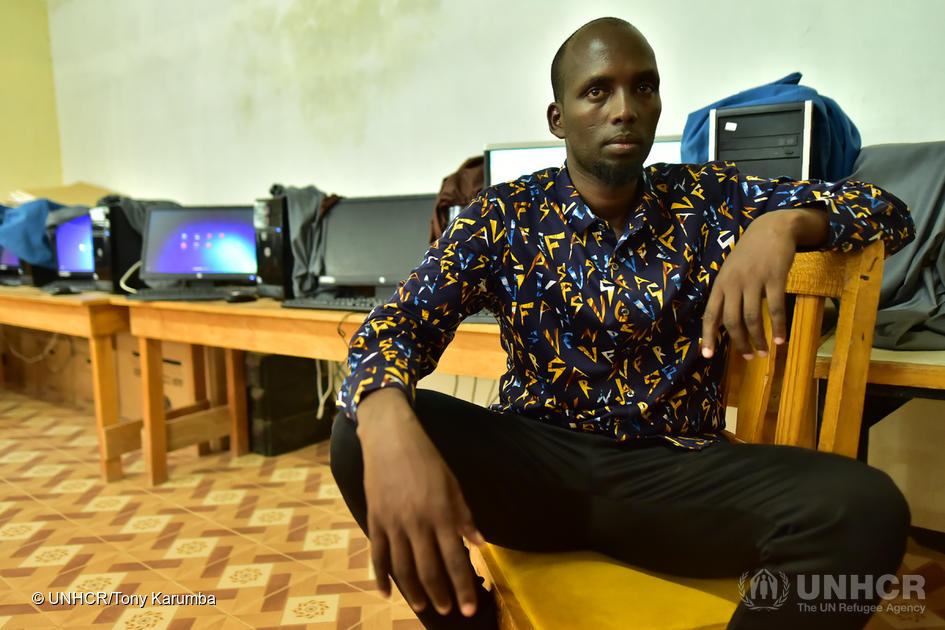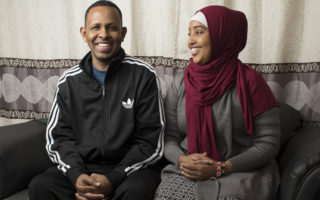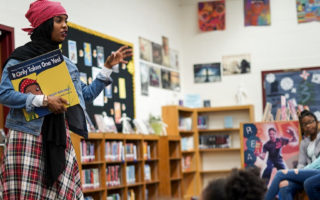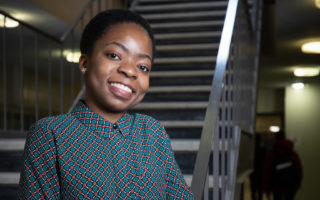
29-year-old Abdikadir Bare Abikar is one of the lucky few selected for a scholarship to study abroad. © UNHCR/Anthony Karumba
Despite being thousands of kilometres away, a group of refugees in Kenya’s Dadaab refugee camp are studying at Canada’s York University. From seven master’s students, the programme is now expanding to 60 learners.
Abdikadir Bare Abikar, 29, is on the verge of completing his Master’s of Education from York University in Canada.
That fact may be not particularly remarkable. What is remarkable is that he is doing it 12,000 kilometers away from Toronto. Since 2013, Abdikadir has been studying online from Dadaab’s remote Ifo refugee camp in Kenya. He is one of only seven refugee students enrolled in a master’s degree in a camp of more than 200,000 people.
“Education changes a person. It has transformed me”
Every day, Abdikadir walks for almost two hours on the sandy, rocky roads of Dadaab to the computer lab, where he connects to the online learning platform that allows him to speak to his classmates and professors.
“Education changes a person. It has transformed me,” says Abdikadir, who is now a teaching assistant for the new cohort of students at the camp. He has recently co-authored an article in the Forced Migration Review, a journal edited by the Refugee Studies Centre at Oxford University, and is busy writing a chapter for a book to explain how Dadaab has benefited from technology.
His professors at York University could not be more proud. Don Dippo, Professor of Education at York, explains: “The refugees that have been trained are now in a position to replace the faculty that taught them years ago.” He adds with a smile: “I long for the day when Abdikadir will be my professor and I will be his teaching assistant.”
Abdikadir knows he is defying the odds. Globally, only 3 percent of refugees are able to access university. The road that has taken him there has been a harrowing one.
By the age of 10, he was an orphan. His father passed away from illness and his mother was killed by members of a militia in Somalia. Fearing for their safety, Abdikadir’s older brother Adam, who was only 15 at the time, fled with him to Kenya. They found refuge in Dadaab. That was 20 years ago.
As soon as he arrived at the camp, Abdikadir enrolled in primary school. With his brother’s help, he excelled in his studies. But even for those who make it all the way through secondary school – an achievement in itself – accessing higher education from somewhere as remote as Dadaab isn’t easy.
Technology provided a solution. Studying online, Abdikadir obtained a teaching diploma from Kenya’s Kenyatta University, one of 23 universities that are part of the Connected Learning in Crisis Consortium, co-chaired by UNHCR. Today more than 12,000 students worldwide are on courses supported by the Consortium.
Abdikadir didn’t stop there. Determined to keep going with his education, he applied for a Bachelor of Arts programme at York University, another member of the Connected Learning in Crisis Consortium, and was accepted. He is now also doing his master’s there.
Abdikadir stresses that studying online does not leave him disconnected from the university campus experience. He follows most of his courses face-to-face with his professors and constantly interacts with his fellow York students. “We learn from each other and exchange ideas on the learning platforms. The PhD students also kindly help proofread my assignments,” he explains.
“One day, I will be a changemaker and go back to my homeland, Somalia. I want to apply new ideas and help bring education to communities outside cities”
He has even been elected as one of the representatives of York’s Graduate Students Association. “I am the information technology coordinator. All the way from Dadaab, I help improve the social media protocols of York University.”
Abdikadir has high hopes for his future and that of his three daughters, aged three and a half, four and five. “As soon as they reach four years old, I will take them to school.
He wants to use his education to make a difference. “One day, I will be a changemaker and go back to my homeland, Somalia. I want to apply new ideas and help bring education to communities outside cities,” he says.
“Without education, a person’s eyes are always closed.”
Read the latest Education Report here





